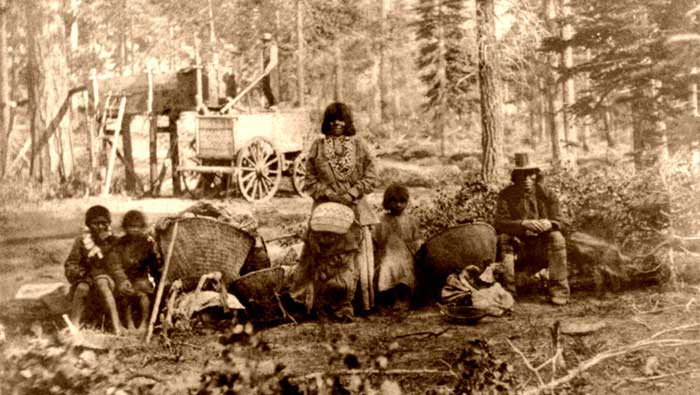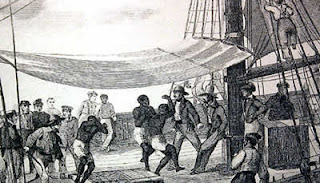The Squaw Valley ski resort in Placer County, California, in reaction to allegations of racism has recently changed its name to Palisades Tahoe; and in so doing has erased the historic reference intended by the original name.
The official Squaw Valley site notes the origin of its name: “ Native American Washoe people used the valley as a summer tribal ground before the 1849 Gold Rush. When westward bound travelers first encountered the valley, they saw only women and children as most of the men were away hunting, and so called it Squaw Valley” a name which in turn comes from the Massachusett Algonquian language meaning ‘female, young woman’.
By capitulating to revisionists despite the historical legitimacy of the name, the owners have in one stroke of the pen removed all traces of the Indian tribe which had lived for years in the Lake Tahoe area, the vicinity of the ski resort.
The Washoe were semi-sedentary hunters and gatherers, their territory extended from the western slope of the Sierra Nevada Mountains to areas as far east as Pyramid Lake in Nevada, including Lake Tahoe and the upper valleys of the Truckee, Carson, and West Walker Rivers. Traditionally, they would spend their summers in the Sierra Nevadas , the autumn in the ranges to the east, and winter and spring in the valleys in between.

Although periodic territorial conflicts arose with the Paiutes leading to tribal warfare, the relations between them and the Washoe were generally peaceful, the two nations benefitting from trade and commerce. Cross-tribal marriages were not unknown.
However the isolated, totally indigenous life of the Washoe was changed completely by the Gold Rush; and wagon trains traversed the tribe’s territory back and forth from the gold fields. Not long after the initial rush, trading posts and way stations were established on Indian land.
By 1851, year-round trading posts were established, and colonizers became permanent residents on Washoe land. The settlers often chose to live on some of the most fertile gathering areas that the Washoe depended on.
A few years after gold was found in California, silver was found in the Great Basin and the “Comstock Bonanza” lured many miners back into Washoe territory. By 1877 the Washoe had been moved to reservations.
Now that the name Squaw Valley has been irrevocably changed, the last remaining trace of Indian settlement in the area has been removed. It is as if the Washoe had never existed; as if the area had always been recreational, white, and developed. By their righteous indignation at the ‘racist’ name of the resort – a completely false allegation as suggested above – revisionists have accomplished the opposite of what they had intended. They have eliminated the indigenous Americans whom they have supposedly championed.
Recently the statue of Robert E. Lee, General of the Confederate Army, was toppled in Richmond, the capital of the Confederacy. Soon all other statues, street and building names, parks and public places bearing ‘unacceptable’ names – i.e. names that have any reference to the antebellum South or to the Confederate leadership of the Civil War – will be removed; and before too many years Richmond will be simply a nice place to visit.
Confederate statues and names are points of historical reference inviting questions about the past, Richmond’s place in the Confederacy, and the very nature of the Civil War. Those who see the statues as symbols of the enduring fight for Southern independence, slavery, and the plantation life of the 19th century are few and far between. The statues are no longer rallying points for segregation, division, and racial hatred. They have been transformed by time and history as symbols of a regrettable but very real past – a past which has its continuing repercussions today. Tearing them down removes perhaps the most accessible path to understanding it.
Statues of Christopher Columbus are coming down throughout the country, most often in Italian American communities which have long looked upon the Italian Columbus as an ethnic hero. The fact that tribute to the European discovery of America should rightfully be given to Queen Isabela and Spain is irrelevant to Italian Americans. It was Columbus, the Genovese, who made the trip.
And honored he should be, not for being an Italian, but for having defied common, but ignorant wisdom about the flat shape of the earth; and for sailing in uncharted, dangerous waters on a mission to find a passage to Asia.
He was unsuccessful, sailed off course, and landed in the Bahamas; but the import of his voyage and is discoveries was monumental – the age of exploration, settlement, Europeanization, and rapid development was underway.
While historical revisionists condemn Columbus and the Spanish for their predatory, selfish, and aggressive pursuit of El Dorado; for beginning the consummate annihilation of indigenous peoples; and for bringing devastating diseases to an immunologically innocent population, most historians simply note Columbus’ coming as the starting point for the creation of modern America.
There is little doubt that had there been no Columbus, there would have been other explorers sponsored by other kings and queens. The continent was destined to be ‘discovered’. Yet there was a Columbus, and it was indeed he who discovered America.
The celebration of Columbus Day actually has nothing to do with the Nina, Pinta, and Santa Maria, Italy, or Columbus himself. It is a celebration of the beginning of European America and the introduction of Europe’s culture, civilization, art, and religion to the New World.
Every country recognizes its founding or its origins; or at least its seminal events. France regards Charlemagne as a national hero for his victory over the invading Saracens at Roncesvalles. He was not only the savior of France but the savior of Europe.
Garibaldi is Italy’s hero for having created a modern, unified country. While England’s history is one of Angles, Saxons, Jutes, Frisians, Danes, and the French, Alfred the Great is regarded as the founder of modern Britain.
All these men are symbolic, mythical figures. They contributed to their nations’ rise to power and influence, but were not the only factor; and so it is with Christopher Columbus.
As importantly, cancelling Columbus and discovery of America by Europeans suggests that such discovery never happened; that spontaneous historical generation was responsible for what America is today.
Such cancelling is moreover a deliberate attempt to discredit the importance of European civilization and to portray it as a malevolent, predatory force; and to lionize the indigenous peoples of North America, despite the Stone Age culture in which they lived at the time of the first European encounters, as somehow pure, pre-capitalist, Rousseau-like Noble Savages.
The hypocrisy of the cancel culture is significant. For decades New England was a prime player in the Three-Cornered slave trade, one in which merchants purchased molasses from plantations in the Caribbean and shipped it to New England and Europe, where it was sold to distillery companies that produced rum. The profits from the sale of sugar were used to purchase rum, furs, and lumber in New England which merchants shipped to Europe.
With the profits from the European sales, merchants purchased Europe's manufactured goods, including tools and weapons. Then the merchants shipped those manufactured goods, along with the American sugar and rum, to West Africa where they were bartered for slaves. The slaves were then brought back to the Caribbean to be sold to sugar planters. The profits from the sale of slaves in Brazil, the Caribbean islands, and the American South were then used to buy more sugar, restarting the cycle.

Newport and Bristol, Rhode Island were the most important New England ports active in the triangular trade; and no one but the most disingenuous New Englander was unaware of the real purpose of such trade – slavery - and given such complicity if not eagerness to profit from the trade, should they not also be called out for their racism?
Wealthy New Englanders freely invested in slave ships and the slave trade; and ships in Boston Seaport carried slaves along the Atlantic and throughout the Caribbean. Slavery was common in New England, and although there were no large plantations, slaves were bought for work on small farms. Yet New England is given a free past by revisionists and cancel culture activists.
The hypocrisy extends much farther. Washington, Jefferson, and Madison all owned slaves; and many reputable early American politicians, educators, and businessmen had some financial, economic, or political interest in slavery. Although Calhoun College at Yale was recently renamed for his ‘retrograde, antisocial ideas’, a review of the men for whom other Yale colleges were named reveals the same history. Shouldn’t the names of these men be expunged as well?
Cancel culture is ugly, destructive, ignorant, and corrosive to the body politic. President Biden and his liberal supporters show no signs of objection. They have leapt onto the progressive bandwagon with enthusiasm and banners flying. They cannot be counted on to step in the way, no Tiananmen Square heroes here. Revisionism and historical ignorance is here to stay.



No comments:
Post a Comment
Note: Only a member of this blog may post a comment.